'Modi wants to be pragmatic -- acknowledge the problem of Pakistan and that full reconciliation is essentially a non-starter, but at the same time grab the low-hanging fruits (such as trade) to put things on a more even keel, to engender enough stability in the relationship to allow him to focus on other priorities.'
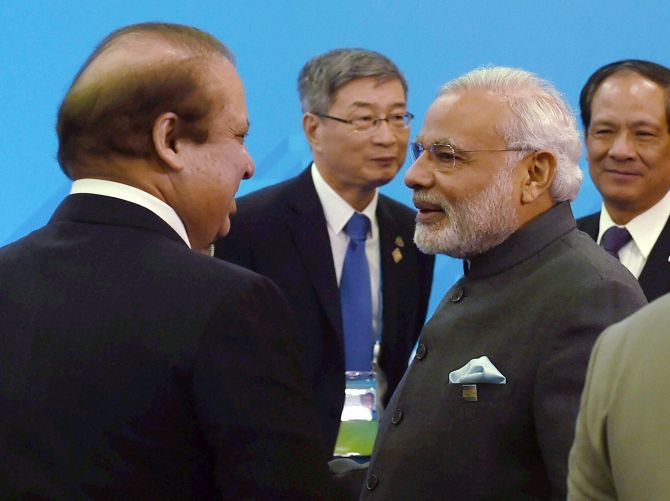
As India's spokesperson Vikas Swarup delivered a strong message to Pakistan on the national security adviser talks on Friday, August 21, evening, Michael Kugelman, Senior Associate for South and Southeast Asia at the Woodrow Wilson International Centre for Scholars in Washington, DC and a sharp observer of developments in the subcontinent, discussed the Pakistan army's role in obstructing a better India-Pakistan relationship among other issues in this in an e-mail interview with Nikhil Lakshman/Rediff.com
What accounts for -- what one retired Indian general and perceptive commentator -- calls 'Pakistan's swagger'? The aggression on the LoC. The resumption of infiltration in Kashmir. The recent acts of terrorism.
There is a whole lot going on here. The basic reality is that Pakistan's military is an emboldened institution. It put Nawaz Sharif in his place a year ago, when an anti-government movement cut him down to size and shrunk his policy space considerably. Any iota of control he may have had over policy toward India was removed.
As a result, he now must deal with India with his hands tied. Any of his representatives, including Sartaj Aziz, have seemingly been reduced to mouthpieces of the military.
To be sure, this hasn't stopped Nawaz Sharif from trying to blaze his own trail. This is a man, after all, who has dared to challenge the military during previous terms in power -- and paid dearly for it.
When he met with Prime Minister Modi at Ufa, he managed to avoid talking about Kashmir -- which angered the security establishment and likely impelled it to ramp up the provocations.
The Pakistani military's swagger these days is meant to send a message to the Indians, the Pakistani government, and anyone else for that matter, that it is still very much in charge.
The Pakistani military is also emboldened by a perfect storm of developments across the region. The Chinese have announced major investments. The Russians have announced major weapons sales.
And despite setbacks in Afghanistan -- efforts to reconcile with Kabul failed and peace talks with the Afghan Taliban are dead in the water -- Pakistan has still ended up on top: After the death of Mullah Omar, the Afghan Taliban's new top two are both favourite sons of the Deep State.
This is all music to the ears of the Pakistani security establishment, and it is very intoxicating too.
In effect, the Pakistani military believes it can do no wrong, at home and abroad. It is in full control, very emboldened, and prepared to provoke. And that's exactly what it has done.
Have you known the Pakistanis to be so openly provocative before a bilateral engagement as they have been before the NSA talks?
Let us not forget that just one year ago, the Pakistanis also invited the Hurriyat leadership to meet with them in India. The difference last year was that the military was not on as big of a high as it is now, so it wasn't being quite as provocative on both political and military fronts, as it is now.
Is it because the Pakistani army wants to queer the pitch before this first-time discussion between the NSAs, knowing well that the Indians will produce a thick dossier on Pakistani-sponsored terror, and by default, the ISI?
There is every reason to believe the Pakistanis want to sabotage these talks. They would derive some modest advantages from them -- they'd be able to grandstand and use the talks as a platform to air out various grievances on Kashmir and the like -- but in the end the Pakistanis certainly know that any useful outcome is unlikely.
In effect, by issuing the invitation to the Hurriyat, one can argue that Pakistan was daring the Indians to cancel.
One reason that the Indians have, as of this writing, not cancelled the talks yet is that they don't want to be seen as caving in to this Indian provocation.
So we could see a rather unpleasant game of chicken play out.
Do you think General Raheel Sharif was livid that Prime Minister Nawaz Sharif had agreed at Ufa to the NSA summit, without consultation with the Pakistani army?
I imagine he was. The Pakistani army isn't a fan of the Pakistani government going unilateral when it comes to India policy, and especially when the ground rules were likely set last year after those anti-government protests cut (Nawaz) Sharif down to size.
Why do you think Prime Minister Sharif agreed to such a summit, and that too to discuss only terror? Did he misjudge the impact that his decision would have at home, especially with the Pakistan army -- surprising for a leader with an almost sure (October 12, 1999, not withstanding) pair of hands?
I think that Sharif may genuinely be interested in engaging modestly with the Indians. There are key PML-N (Pakistan Muslim League-Nawaz) powerbrokers that run businesses in Punjab and who would be big winners from a normalised India-Pakistan trade relationship.
Trade is a low-hanging fruit item in India-Pakistan relations, and perhaps Sharif saw the Ufa meeting as one small step toward returning to secretary-level talks, which would have the proper scope to discuss trade.
Keep in mind that resuming secretary-level talks will be a pitch that Sartaj Aziz is expected to make. I don't expect the Indians to be particularly receptive, though.
Or was it, as some believe, a deliberate ploy to ensnare the Indians in a maze of contradictory responses, backed by aggression on the LoC?
Quite frankly, I am not sure that Sharif would be thinking so strategically in this context. My sense is that he saw an opportunity -- perhaps one laden with the prospect of future exchanges related to trade -- and he pounced on it.
Don't forget that there have been other goodwill gestures in recent weeks carried out by Pakistan (and India), including the release of detained Indian fishermen and the dispatch of mangoes to Modi.
These examples may seem superficial, but they are significant in that they indicate that Sharif (and Pakistan on the whole) aren't about to torpedo the relationship completely.
Do you think the decision to convene a meeting of Hurriyat leaders before Sartaj Aziz met Ajit Doval is a deliberately provocative move to make it untenable for India to go ahead with the talks, and save Pakistan embarrassment?
Yes, I think that by making this move, Pakistan was daring India to cancel the talks, which would actually be helpful to the Pakistanis.
I think, though, that the Pakistanis may have underestimated the Indians' willingness to play hardball and stare down Pakistan.
India doesn't want to give in to this Pakistani provocation -- after all, isn't that a common refrain of this Indian government?
India is in fact trying to turn the tables and put the pressure on Pakistan by threatening to forcibly prevent the Hurriyat leaders from either leaving Srinigar or arriving in Delhi.
If India doesn't cancel the NSA talks but does prevent the Hurriyat leaders from meeting with the Pakistanis, Pakistan is all of a sudden in a tough spot. And that's just what New Delhi wants.
Do you believe the NSA talks could have served any purpose given the charges and dossiers that would have been exchanged?
Very little, other than to provide reassurance and highlight that the relationship isn't falling apart completely, and that there are still pathways of cooperation, albeit tenuous ones.
Let's keep in mind that no high commissioner has been asked to leave, and the situation hasn't really escalated as much as it could. By having the NSA talks, cooler heads will prevail, at least for now.
How would such a summit address the issue of terror, given the fact that neither side can provide guarantees that would satisfy the other side that it would not sponsor terrorism?
It's very simple: Nothing at all would be done to address terror at this summit. Not a thing. It would be interesting, however, to see this much-ballyhooed 'dossier' that Pakistan has repeatedly talked about that allegedly features reams of evidence about India's destabilisation of Pakistan.
Does this dossier really exist? Or is it simply a mirage? And if it does exist, what does it say? Many inquiring minds would want to know.
Was such a summit conceived by the Indians to accelerate the process of justice in Pakistan in the 26/11 attacks case?
What reasons would you attribute to the Indian desire to have an NSAs summit?
Several things here. My sense is that Modi wants to focus more on his top priority, economic recovery.
So long as the LoC keeps flaring up and Pakistan takes up his attention, it's hard to really bear down and focus on that.
If you have these talks, then you provide more breathing room, even if temporary.
This can in turn allow Modi to refocus his efforts on the economy, at least until the next crisis arrives.
My sense is that India wants Pakistan to be a distraction, not a threat -- and by having talks, you can push back the problem a bit so that it's only a distraction.
Some may argue that India wants these talks in order to have an opportunity to corner the Pakistanis on terrorism. If true, that seems suspect.
Even if Pakistan is cornered on terrorism, it won't change its policies of State-sponsored militancy any time soon.
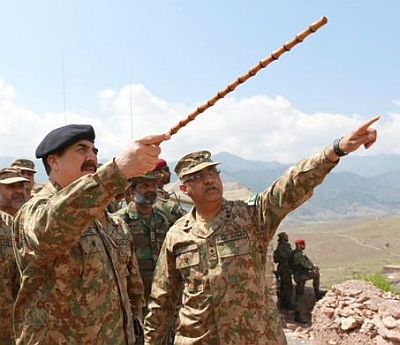
Do you believe the NSA talks and Pakistan's relationship with India has fallen victim of Pakistan domestic politics, where the military would like to assert itself over a leader it cannot quite control?
Yes, that is exactly it -- though I think the military can control him a lot more than it could when he first took office for his latest term in 2013.
My sense is that it is unhappy about Ufa, and it wants to reassert (as if we didn't know) who is really boss.
Sharif is not as pliable as his predecessors, and that's something that likely weighs heavily on the minds of the Pakistani security establishment.
Any opportunity to reassert its strength, then, is seen as desirable. And its policy toward India certainly gets caught up in such considerations.
Is this embarrassment to Prime Minister Sharif a continuation of the PTI party's blockade of the national assembly to force Mr Sharif out of office, a campaign that was seen to have the military's active encouragement and support?
I don't know if it's meant to embarrass Sharif, but more so cut him down to size even more.
My sense is that the military wants to show Sharif that he's trying to remove himself from a corner that he has already been painted in to.
In effect, you can try to assert more policy space on India, but you can't really pull it off in the end.
How long do you think Prime Minister Sharif can last in office? What would be needed to do to finish his full term?
I am fairly confident he'll serve out the rest of his term, so long as he doesn't try to push the envelope as he did in previous terms and as he apparently did a bit at Ufa.
Pakistan's democracy has consolidated since the last coup more than 15 years ago, and it's not as easy to force a democratically elected leader out of office.
The only scenario I could envision is not the military taking over power, but rather Sharif being forced into early elections.
I see this as unlikely, as I don't envision him trying to push back forcefully enough to cause the military to take such drastic steps.
To finish his term, he will need to do what his predecessors in the last PPP (Pakistan People's Party) government did -- stay in his place and focus on economic and other non-security matters.
I wrote some time back that Sharif could find himself in hot water if he doesn't do enough on the energy crisis -- a major issue that he was elected with a mandate to fix. Well, he hasn't fixed it; he hasn't even come close.
If there are violent and continuous protests about the energy crisis, Sharif could find himself in a vulnerable position. Though I think it is unlikely he'd be forced out.
How do you see the Modi government's handling of Pakistan? Does it have a Pakistan policy?
Modi wants Pakistan to be a distraction, not a crisis. He wants to be able to keep it at arm's length so that he can focus on economic and other domestic issues, and on boosting its relations with countries in Asia and beyond.
My view is that Modi would like to have a workable relationship with Pakistan, even if some of his party colleagues don't agree.
Modi wants to improve India's troubled relations with South Asian countries through the use of economic diplomacy. And this includes Pakistan.
I imagine that Modi would be delighted if the two countries finally formalised their trade relationship.
My sense is that Modi wants to be pragmatic -- acknowledge the problem of Pakistan and that full reconciliation is essentially a non-starter, but at the same time grab the low-hanging fruits (such as trade) to put things on a more even keel, to engender enough stability in the relationship to allow him to focus on other priorities.
How do you see the immediate future for India-Pakistan relations? Will there be some sort of rapprochement, some steps back from the abyss? Or will we see more aggression from both sides?
In the last few years the relationship has been up and down. I imagine things will calm down a bit in due course.
But given that in Pakistan you have India policy controlled by an anti-reconciliation military, and in India you have a government that says it won't sit quietly in the face of provocation, then I think we are guaranteed to see at least low-grade fireworks in India-Pakistan ties for the forseeable future.
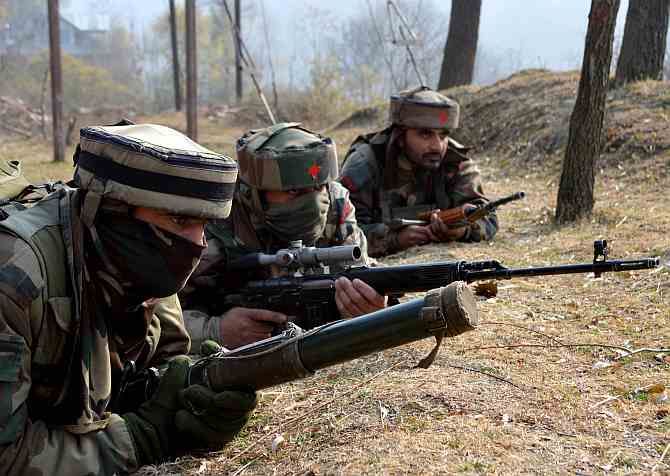
Indian hawks are already talking of teaching the Pakistanis a lesson. Do you see a limited war on the horizon, as some fear?
No, I don't. The only plausible scenario is if there is a major terror attack in India -- more devastating than Gurdaspur though less devastating than Mumbai -- that can clearly be traced back to Pakistan, then we could see India launching limited, targeted air strikes on terrorist facilities in Pakistan.
Even this isn't necessarily inevitable, though. I'm not sure India has the capacities to do something like this.
More importantly, even if India does carry out limited strikes, the terrorist infrastructure extends so far and wide in Pakistan that such tactics wouldn't work.
There would simply be more terrorism in India -- especially as a bellicose Indian response would embolden Pakistani terrorists, and likely their State sponsors in Pakistan as well.
What needs to be done to restore some balance in India-Pakistan relations, so that matters don't spiral out of control?
There needs to be some sort of negotiation that focuses on softer issues. Perhaps a meeting between finance ministers to work out a formalised trade relationship. The two sides are very close on that front.
The idea should be to lower temperatures and generate confidence-building measures. After that has been done, it will be easier to think about next steps.
What those steps can be are unclear, and there likely aren't many that could be taken. But the most immediate objective should be to remove some of the levels of toxicity from this very troubled relationship.



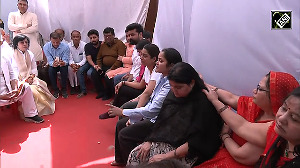
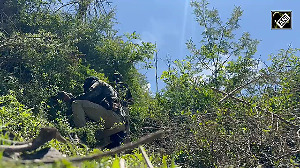

 © 2025
© 2025